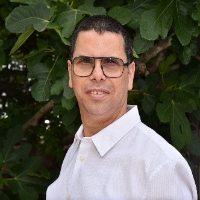Biography
Dr. Hen Friman is a highly accomplished researcher and educator with a strong background in the field of renewable energy and chemical engineering. He holds both a Ph.D. and Master's degree from Bar-Ilan University, with his Master's thesis focusing on the impact of Cyt1Aa on prokaryotes and his Ph.D. research centered around energy production through aromatic chemical degradation by bacteria using "Bio-Fuel Cells."
Since 2012, Dr. Friman has been an integral part of the Faculty of Engineering, where he currently serves as the academic director at the Renewable Energy & Smart Grid Excellence Center at the HIT - Holon Institute of Technology. His work in academia is marked by innovative teaching methods, particularly in the development of a "paperless" laboratory for solar, wind, and water energy studies. Additionally, he has been instrumental in managing the "Energy Supervisor" training program at HIT.
Dr. Friman has also been a key contributor to the development of the "Pre-Project and Developing Soft Skills for Engineers" program designed for undergraduate B.Sc. students. This course aims to equip students with essential employability skills, including teamwork, time management, risk and quality control, design excellence, and presentation excellence.
His research interests encompass a wide array of topics, including renewable energy, fuel cells, microbial fuel cells, water and wastewater treatment, chemical engineering, ecological education, and fostering academic collaboration. Dr. Friman's extensive expertise and contributions make him a valuable asset to the academic and research community, with a profound commitment to advancing knowledge and practical solutions in the field of sustainable energy and engineering.
Research Interest
Renewable energy, fuel cells, microbial fuel cells, water and wastewater treatment, chemical engineering, ecological education, and fostering academic collaboration

Editor
Work Details
H.I.T - Holon Institute Of Technology
Faculty of Engineering
Israel
Contribution by Topic Area
Why publish with us?
Global Visibility – Indexed in major databases
Fast Peer Review – Decision within 14–21 days
Open Access – Maximize readership and citation
Multidisciplinary Scope – Biology, Medicine and Engineering
Editorial Board Excellence – Global experts involved
University Library Indexing – Via OCLC
Permanent Archiving – CrossRef DOI
APC – Affordable APCs with discounts
Citation – High Citation Potential
Which articles are now trending?
Research Articles
- Assessment of Thermal Uniformity of Heating Plates Using a Thermal Imaging Camera
- Sensor-based Sorting using De-XRT Sensor Applied to a Greenfield Copper Ore Project in Southern Brazil
- Integrated Multi-fidelity Structural Optimization for UAV Wings
- Development of a Mechanical Seal Closed Design Model
- Zinc Supplementation in Anorexic Children with Vomiting Syndrome: Evaluation from a Randomized Controlled Trial in Vietnam
- A New Modification of Classification of Traumatic Patients with Pelvic Fracture
Advertisement






